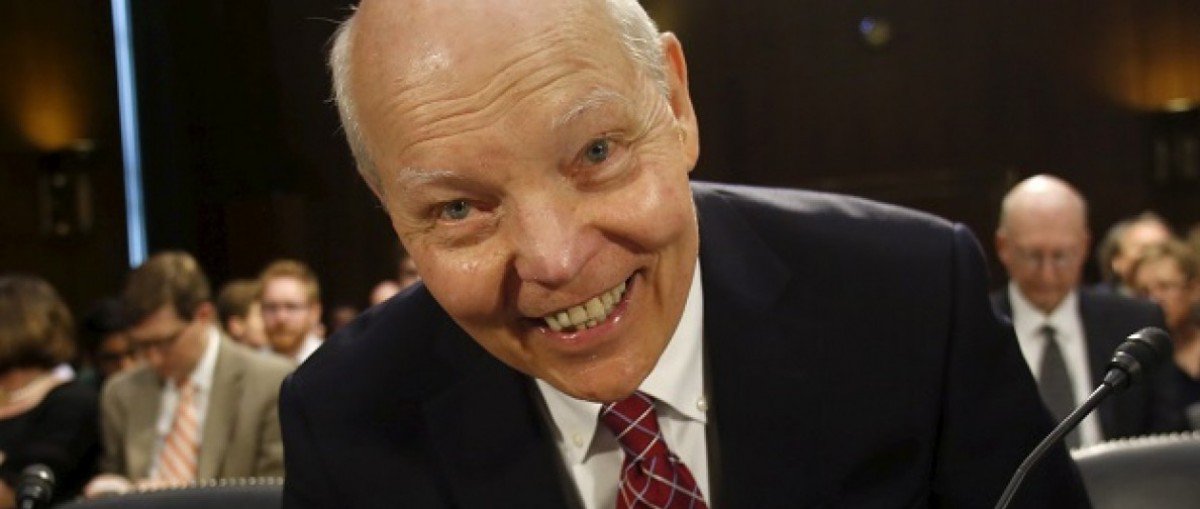9 Out of 10 IRS Asset Seizures Defraud Innocent Taxpayers!
 Innocent until proven guilty is a fundamental principle of the American legal system. But it is not the policy of the IRS.
Innocent until proven guilty is a fundamental principle of the American legal system. But it is not the policy of the IRS.
And a new tax-season report airing Sunday on investigative reporter Sharyl Attkisson’s nationally syndicated show “Full Measure” sheds light on just how badly the IRS abuses one of its most odious policies: 9 times out of 10.
WND has long covered cases of abuse committed by the IRS under its civil asset-forfeiture procedures, such as that of baker David Vocatura, who went through a legal nightmare all because his family business, a nearly 100-year-old community institution, made a series of cash deposits under $10,000.
It’s not illegal to do that. But it raises the suspicion of the IRS because banks are required to report cash deposits in excess of $10,000.
That’s due to the Bank Secrecy Act of 1970, amended by the Patriot Act in 2011, which federal prosecutors consider an important tool to investigate drug trafficking, money laundering, and terrorism.
But the IRS seems to be using the law as a cash cow to fleece innocent taxpayers.
For instance, the IRS raided Vocatura’s Bakery in 2013 and seized $68,000 from its bank account under civil asset-forfeiture procedures. For three years the IRS pressured David and his brother to plead guilty to criminal charges of “structuring” bank deposits and to agree to surrender the money. They refused.
In retaliation for their refusal, the agency then launched a criminal tax investigation of their business, requiring them to account for nearly every financial transaction over an eight-year-period. That’s when the Vocatura’s took the IRS to court.
Last May, just hours after Vocatura’s Bakery and the Institute for Justice sued the IRS to get the money back, the IRS announced it would return all of the money but continue with its retaliatory tax investigation.
Federal prosecutors never brought their case before a judge, instead pressuring the owners to agree to a “voluntary” forfeiture. A year ago February, the two Vocatura brothers were presented with a plea agreement that required they plead guilty to criminal structuring, accept a three-to-four year prison sentence, forfeit the original $68,000 and surrender an additional $160,000 worth of personal assets. Their refusal sparked the demand for eight-years worth of business records.
“The IRS should not be launching a fishing expedition into eight years of a business’s financial records just because the owners will not voluntarily agree to forfeiture of their money,” said attorney Robert Everett Johnson last May, while representing Vocatura’s Bakery.
He added, “Three years after taking the Vocatura’s money and forcing them into a prolonged legal nightmare, the IRS is still desperately searching for some way to retroactively justify the seizure.”
But Attkisson found that such cases of the IRS targeting innocent taxpayers are far more the rule than the exception.
She provided WND a preview from “Full Measure” airing Sunday in which the five-time Emmy-award journalist cited a new report from the Treasury Department’s watchdog who determined the IRS has seized millions of dollars from taxpayers “who haven’t done anything wrong.”
Attkisson said, “The Treasury Department Inspector General looked at a sampling of cases and found that nine out of ten times, the IRS seized money that Americans had obtained legally.”
She continued, “The IG (inspector general) also found the government pursued cases based solely on patterns of cash deposits without looking for associated criminal activity,” which it had agreed to cease doing in 2014.
The reporter interviewed the Institute of Justice’s Robert Johnson, who observed, “The problem is this law has been applied to all kinds of innocent small business owners who aren’t trying to hide anything from the government. They just happen to be depositing cash in the bank in amounts under ten thousand dollars.”
Johnson also described a pattern that would explain how an innocent, law abiding taxpayer such as Vocatura could be sucked into the gaping maw of an IRS fishing expedition.
“The IRS was basically trolling through people’s bank statements looking for cases where they could find a pattern of under ten thousand dollar deposits.
“Then when they found that pattern, rather than going to that person and saying, ‘Hey you know what’s going on here, is there some sort of explanation?’ Instead they would just seize the entire bank account, and then they would hold it.
“The first time these people realize they’re even potentially violating the law is when someone from the IRS shows up and tells them they’ve already seized their entire bank account. I think what this really shows is nobody is safe from this kind of abuse of civil forfeiture and we all are potentially at risk for being targeted.”
Johnson said, “civil forfeiture allows the government to take people’s property based on the suspicion of criminal wrongdoing but without having to actually prove to a court that somebody did something wrong. And that takes the presumption of innocence and it turns it on its head.”
Despite the fact the IRS agreed in 2014 to seize cash only when there’s evidence of criminal activity the problem did not go away, and Congress began investigating the bureau’s civil asset-forfeiture policy last year.
In June, the IRS announced a “special procedure to allow property owners to request return of property, funds in specific structuring cases.”
And Attkisson reported, “The IRS has invited more than 1800 people impacted by the questionable seizures to petition to have their money returned.”
Johnson concluded, “In America people are supposed to be presumed innocent but under civil forfeiture you’re presumed guilty and then you have to prove your own innocence in order to get your property back and that’s wrong, it’s un-American, it’s unconstitutional and it has to end.”
http://www.wnd.com/2017/04/9-out-of-10-irs-asset-seizures-fleece-innocent-taxpayers/
